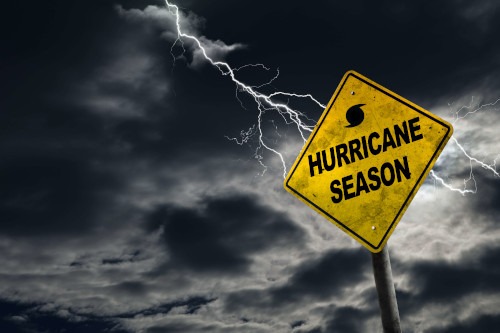
Hurricanes are a fact of life in Florida. As the winter months come to a close, homeowners across the state are prepping for hurricane season. This preparation routine can involve many moving parts, including fortifying the physical home or safeguarding valuables. One important step to take in this process may involve compiling information that would help you file a property damage insurance claim. Starting well before a hurricane strikes may leave you in a better position than waiting to file after a devastating storm damages your home. To do so, understanding homeowners property damage coverage becomes vital. You’ll need to know what kind of damage hurricanes cause and if your insurance policy covers it.
Below, we outline what to do to prepare your home for a hurricane and how to file a claim after a storm. To learn more, contact our offices to schedule a free initial consultation.
Steps You Must Take to Prepare Your Home for Hurricane Season
Hurricane preparedness in Florida is a hot topic as the spring approaches. Some steps to take before it’s in full swing include:
Take photos of your home -A critical piece in filing a successful property damage claim involves providing evidence of the extent of the damage. This means that the better your evidence, the more likely your claim will receive approval. Many homeowners neglect this aspect of hurricane preparation and later have a difficult time securing the funds they need to fully restore their homes. While it may seem tedious now, it’s a good idea to take photos of both the inside and outside of your home, as well as your valuable belongings, just in case you need to show them to your insurance provider later.
Read through your homeowners insurance policy -Another crucial step is reading through your insurance policy to really understand what it covers. It’s not uncommon for homeowners to neglect this step only to find out they can’t cover their hurricane deductible after a devastating storm. By reading through your policy before hurricane season, you can rest assured your home is protected by setting aside enough money to cover your deductible, or you can purchase additional coverage to protect it. Boca Raton flood damage, a common side effect of hurricanes in Florida, is typically not covered. You should consider adding this coverage for extra protection. Additionally, consider backing up your copy of the policy in electronic form so you can access it again if your physical copy is destroyed in the storm.
Make a list of nearby contractors – The aftermath of a hurricane in Florida can leave entire communities devastated, both physically and psychologically. Living through a hurricane can be mentally and emotionally draining, and these effects definitely take their toll on survivors. Looking for contractors to fix your home after a storm can feel overwhelming if you are already suffering these effects. Making a list of contractors now can save you time and energy after a storm.
What Kinds of Property Damage Do Hurricanes Cause?
Hurricanes in Florida are prone to causing specific types of property damage. High winds can impact or completely remove siding, shingles, or decks, while debris picked up by the wind can cause window damage. If strong enough, hurricane winds can even snap trees and power lines, leading to severe roof damage. Flooding is a common byproduct of hurricanes, so water damage in basements and main levels of buildings is also quite common.
What Property Damage Is Covered?
Homeowners in Florida should expect to pay a deductible for hurricane damage. For the damage to count as caused by a hurricane, the National Weather Service must declare the storm a hurricane. You can expect any damage that occurs after a hurricane watch or warning is declared, and up to 72 hours after the storm passes, to be covered by your policy. However, flood coverage is typically not required by the state, so your homeowners insurance policy may not cover floodwater damage. if this is true of your policy, then you may want to consider purchasing this extra coverage as a precaution.

What Do You Do After the Storm Hits?
Take photos of the damage -After a hurricane in Florida, your home may suffer extensive damage. It’s important to take photographs of everything, recreating the photos you took prior to the storm. Check for hidden damage, like damage to the structural integrity of the building, so you can file this in your claim as well. Document the walls, ceilings, roof, and floors of your home, and try to get as many angles as seems reasonable.
File a hurricane damage claim – After photographing the damage, contact your insurance provider as soon as possible to report the damage. File a claim as soon as you can in order to speed up the process. You may encounter surprises during this process, like a high deductible you weren’t planning for, or even a denial of your claim if you didn’t file the claim correctly. You may want to contact a property lawyer to help you during this time.
Get in touch with a contractor for repairs -Next, you’ll want to pull out that list of contractors you created and start making calls. The quicker you can get someone to your home, the faster it can be repaired and returned to normal. You can speak to your insurance provider about contractor work and who will pay them according to your policy.
File Your Hurricane Damage Claim Using GED Lawyers
In the aftermath of a hurricane, homeowners are often left feeling overwhelmed and stressed. Surviving a hurricane is no small matter, and the last thing you want to do is deal with your insurance company. Getting a head start on this process is the quickest way to restore your life back to normal. And this process need not be unnecessarily difficult. An experienced property attorney can guide you through securing disaster relief smoothly and successfully.
If you are having difficulty filing your property damage claim, contact the experienced attorneys of GED Lawyers. Our goal is to make the process easy for you, while also fighting to secure proper compensation. To learn more about hurricane damage claims, how to prepare for a storm, or what to do if your claim is denied, contact us today.

